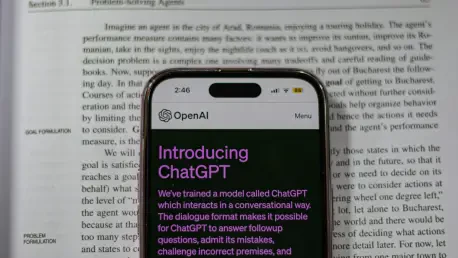In an era where artificial intelligence shapes everything from healthcare to national security, the ethical implications of such powerful technology have never been more critical to address, especially as AI systems become increasingly integrated into daily life. Concerns about bias, privacy, and accountability continue to mount, prompting a pressing need for education that balances technical prowess with moral responsibility. Fairfield University has emerged as a frontrunner in tackling this challenge through a groundbreaking collaborative research initiative supported by a substantial grant from the National Science Foundation (NSF). With nearly $400,000 in funding over a three-year period, this project positions Fairfield as the lead institution in a partnership with Indiana Tech and Prairie View A&M. The effort focuses on embedding ethical considerations into AI education, aiming to cultivate a new generation of professionals equipped to develop trustworthy and secure systems that prioritize societal good over unchecked innovation.
Pioneering Ethical AI Education
At the heart of this ambitious project is the mission to integrate ethical discourse into the technical training of computer science students, ensuring that future AI developers are as adept in moral reasoning as they are in coding. Spearheaded by Sidike Paheding, PhD, associate professor and chair of the Computer Science Department at Fairfield’s School of Engineering and Computing, the initiative seeks to create safer AI technologies by fostering a deep understanding of ethical challenges. Dr. Paheding, serving as the principal investigator, collaborates with David Schmidt, PhD, associate professor of management at the Charles F. Dolan School of Business, to bring a dual perspective to the project. Their combined expertise underscores a growing recognition in academia that technical innovation cannot be divorced from ethical responsibility. By prioritizing this intersection, the project aims to address real-world issues such as algorithmic bias and data privacy, preparing students to navigate complex dilemmas with both skill and integrity.
Beyond the conceptual framework, the initiative is grounded in practical applications designed to transform how AI ethics is taught. Faculty across the collaborating institutions will be equipped with innovative teaching tools, including case studies that highlight real-life ethical quandaries in AI development. These resources will facilitate classroom discussions that challenge students to think critically about the societal impact of their work. Additionally, gamified learning modules are being developed under Dr. Paheding’s oversight to make ethical training engaging and interactive. This hands-on approach ensures that students do not merely learn abstract principles but apply them in simulated scenarios, honing their decision-making skills. An open-access repository of case studies will further extend the project’s reach, allowing educators nationwide to incorporate these materials into their curricula and amplifying the impact of this NSF-funded endeavor on a broader scale.
Collaborative Efforts and Institutional Support
The collaborative nature of this project is a cornerstone of its potential for widespread influence, bringing together diverse perspectives from Fairfield University, Indiana Tech, and Prairie View A&M. With Fairfield receiving the largest share of the NSF funding—$231,958 under Award #2518485—the university plays a pivotal role in coordinating efforts, while its partners receive support under separate awards to contribute their unique strengths. This partnership reflects a broader trend in higher education to tackle the ethical dimensions of emerging technologies through interdisciplinary alliances. By pooling expertise in computer science, business, and ethics, the project creates a holistic approach to AI education that transcends traditional academic silos. The shared commitment to developing responsible AI systems highlights the urgency of addressing ethical concerns in a field that evolves at a breakneck pace, often outstripping regulatory and societal frameworks.
Fairfield’s leadership in this initiative is bolstered by its robust institutional resources, which provide a strong foundation for advancing AI ethics education. The Patrick J. Waide Center for Applied Ethics and the AI and Technology Institute at the Dolan School of Business bring together specialists from various fields to inform the project’s direction. These centers serve as hubs for dialogue and innovation, ensuring that the initiative remains aligned with both cutting-edge research and the university’s Jesuit Catholic mission of serving the greater good. This alignment is evident in the project’s focus on forming students who are not only technically proficient but also dedicated to ethical stewardship. As the initiative progresses, it will also involve mentoring graduate students and managing strategic partnerships with external advisory boards, further enriching the educational ecosystem and ensuring that the outcomes resonate with national interests in trustworthy technology development.
Shaping the Future of Responsible AI
Looking back, the launch of this NSF-funded project marked a significant milestone in the journey toward responsible AI development, as Fairfield University and its partners laid the groundwork for a transformative educational model. The collaborative effort demonstrated a clear commitment to weaving ethical considerations into the fabric of technical training, ensuring that students were equipped to confront the moral complexities of their field. Through innovative tools like gamified modules and accessible case studies, the initiative redefined how AI ethics could be taught, making it both practical and impactful.
Moving forward, the focus should shift to scaling these educational innovations beyond the collaborating institutions, encouraging other universities to adopt similar frameworks. Stakeholders in academia and industry must prioritize sustained funding and policy support to embed ethics in AI curricula on a national level. By fostering partnerships and sharing resources, the lessons learned from this project can inspire a broader movement, ensuring that the next wave of AI professionals designs technologies that uphold trust and accountability for generations to come.









